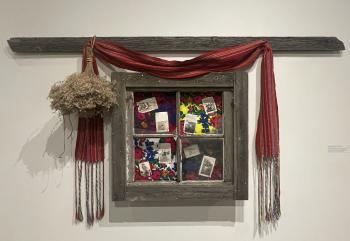Image Caption
Local Journalism Initiative Reporter
Windspeaker.com
In her debut exhibition Apples & Train Tracks, author Arnolda Dufour Bowes has created a multi-sensory art installation that draws the audience into the complex history of the Road Allowance Métis in Saskatchewan.
Apples & Train Tracks combines original artwork, photography, film, historical artifacts and narration from Bowes’ award-winning book 20.12m: A Short Story Collection of a Life Lived as a Road Allowance Métis.
She said she wanted people to “walk beside us and walk with us, to feel what it felt like,” for the Métis families who lived in those communities. After being forcibly displaced by the government in the late 1800s and early part of the 1900s, there were Métis who ‘squatted’ on the road allowances.
“I want people to experience the story. I don't want them to just read a story,” Bowes said of the new exhibit.
Following the Red River Resistance in 1869 and the North-West Resistance in 1885, many Métis faced relocation and dispossession of their territories. Some built communities in the strips of land set aside as buffers between roadways and private or government held property.
The Road Allowance Métis communities, as they came to be known, often consisted of a few small shacks established adjacent to settlements and First Nations reserves throughout the Prairie provinces. The Road Allowance communities were broken up beginning in the 1930s.
The conceptual stirrings of the Apples & Train Tracks exhibit came to Bowes while on a trip to Punnichy, Sask. to speak at schools about her book 20.12m. Arriving a bit ahead of schedule, she stopped at the site of the former Road Allowance community where her father had lived. She took a recording.
“I sat there on the railway recording this. I could hear the birds and the wind, and all I kept thinking about was how those families felt. As I walked along the tracks, my feet were crunching on the rocks. And then this image starts to come. As an artist, we all live in concepts and ideas,” she said.
The experience of living with no running water or electricity would alone be difficult for most Canadians to connect with. Being pushed into rail cars for relocation and having your homes burned to the ground, as happened to the Punnichy Road Allowance Métis community, is almost unimaginable.
“How did they feel when they were on the train as it rode past and they could see their houses burning? I can't imagine that at all,” Bowes reflected.
Apples & Train Tracks is open until June 23 in the Greg Yuel Gallery at Wanuskewin Heritage Park. The installation features a reconstructed stretch of train track in the gallery, as well as reclaimed pieces of her father Arnold Charles Dufour’s Road Allowance home near Punnichy.
Bowes said she was compelled to collect some of the pieces from her father’s house long before she started thinking about creating the art exhibit.
Fifteen years ago, Bowes and her husband took her now-late father to visit his old home one last time. Elements like the handle on the front door and a board hanging off the top of the house called out to her.
“We were there and I told my dad I want to steal the doorknob and he wouldn't let me steal it,” Bowes laughed.
“Before we left, I ran back to the house and that piece of board was hanging off. And I grabbed it. I ran back to the truck and my dad was yelling at me: ‘Don't take anything! What are you going to do with a piece of board anyways?’
“I put it in the back of our truck. I'm like, ‘I don't know yet, but I just know I'm going to use it for something’.”
Later, with the permission of the property owner, Bowes returned for the door and window. With the reclaimed pieces sitting in her home, holding stories from her kokum and dad, “that's where everything started to grow from, and I just wanting people to experience it and walk with us.”
Since Apples & Train Tracks opened on May 18, Bowes said she’s heard from visitors who appreciated how the elements of the exhibit come together to tell the story, and that the Métis story is “being told through our lenses and our view.”
Like the fictionalized stories in 20.12m, the varied artistic forms displayed in Bowes’ exhibition contain the essence of her father’s actual lived experiences in the Road Allowance community.
“It's a piece of history that we can't change,” Bowes said. “The reason why I share it is because, for me, you can't have reconciliation until there is truth. And by revealing truth, we can start coming together again...
“We can't change [history] but we can recognize it and have that empathy with the different people who have suffered and that went through these things.”
Bowes said she is in talks to bring Apples & Train Tracks to other locations in Saskatchewan. And, because the history of the Road Allowance Métis stretches from Manitoba to Alberta, she hopes the exhibition will soon be showcased in galleries throughout the other Prairie provinces as well.
Local Journalism Initiative Reporters are supported by a financial contribution made by the Government of Canada.

